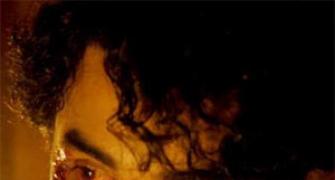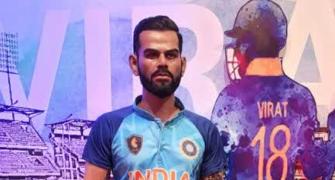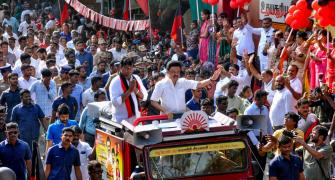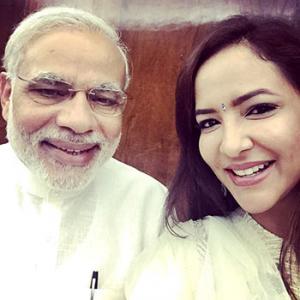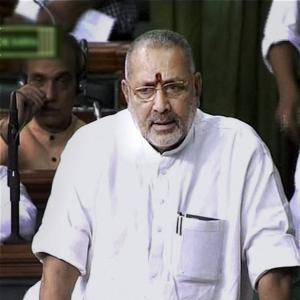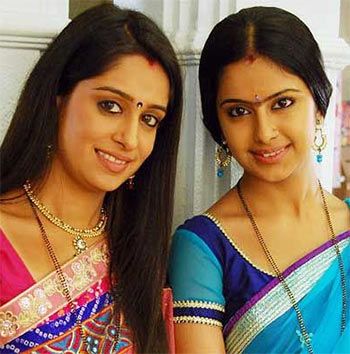 'Today, 65 per cent of the slots have been allotted to dubbed serials.'
'Today, 65 per cent of the slots have been allotted to dubbed serials.'
'Soon all our people will be out of jobs.'
Kavitha Bharathy, President, Federation of Small Screen Technicians, Tamil Nadu, says they want to ban dubbed Hindi and Korean serial
The alleged suicide of popular Tamil television director Balaji Yadav has triggered massive outrage in the community.
Director of popular serials like Arasi and Urvugal, Yadav is said to have committed suicide due to lack of work and mounting debts.
Members of several unions, of producers, directors, artists, writers and technicians, came together on April 15 to register their protest against the trend by popular TV channels to telecast dubbed Hindi and Korean serials.
This trend has sidelined Tamil serials and work in the industry is drying up, they allege.
The meeting was supported by the Tamil Television Producers Council headed by Radikaa Sarathkumar, Kavitha Bharathi heading the technicians union, actress Nalini, president of the TV Artist Association, and popular film directors Vikraman and Manobala.
Shooting for all Tamil serials was suspended and the protestors demanded the total ban of dubbed serials by local channels.
"We have asked for a complete ban on dubbed serials. If they do not comply, we will appeal to the government to intervene on our behalf.
“In Karnataka there is a complete ban on dubbed serials or films, and the government supports it. Why can't we too adopt the same policy?
“Today 65 per cent of the slots have been allotted to dubbed serials. Soon all our people will be out of jobs," said Kavitha Bharathy, president, Federation of Small Screen Technicians, Tamil Nadu (FESST comprises 24 crafts unions of the film and TV industry).
Nalini, who was recently elected president of TV Artist Association, says that the rate at which this trend is gaining momentum is alarming.
"Earlier it was just a couple of dubbed serials; today their number exceeds the number of Tamil serials that are being telecast.
“Even some of the primetime slots have been replaced with dubbed serials.
“Korean serials too have joined the fray. What next? Where will it end?
“Soon none of us will have jobs. Dubbing is way cheaper that making serials. How can we compete with that?" she asks.
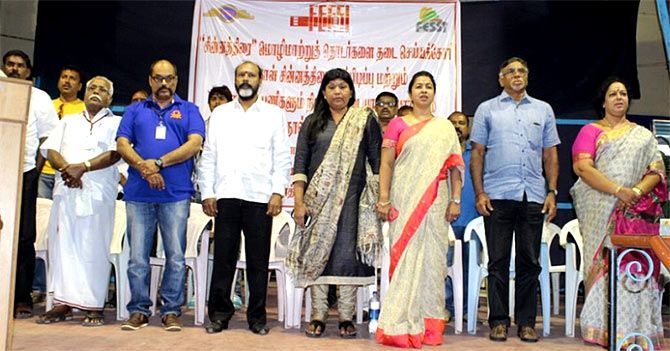
Though Balaji Yadav's death sparked the protest, Bharathy explains that the unions have been protesting for a long time.
"We have been protesting for over three years now. But there has been absolutely no response from their (the TV channels) side. The situation is deteriorating every day.
“More than 20,000 people are dependent on this industry and this trend has hit them hard,” he says.
Bharathy adds, “Unlike cinema, the television industry was more stable, secure and guaranteed a regular income. Over time the industry grew larger and larger, supporting hundreds of people - artists, writers, editors, cameramen, makeup artists, lighting crew and many more.
“It was like any other regular nine-to-five job and people depended on it to fulfil their various commitments.”
At one time Tamil Nadu was the centre of the television serial industry in the South. Malayalam and Telugu serials were also shot here.
Gradually most of them moved back to their own states. The technicians who were dependent on them had to turn to Tamil serials for their sustenance.
Bharathy says Balaji Yadav's suicide shook everyone.
“We have to take a stand before it is too late and more unfortunate incidents happen."

Audiences may prefer the dubbed Hindi serials because they are tired of the never-ending mother-in-law and daughter-in-law sagas in Tamil serials.
When this was put to Nalini, she said that Tamil serial makers did not have the same resources.
"Most Hindi serials have similar content; it is their grand and luxurious sets that are their biggest attraction. If we too have the same resources, our serials can compete with the best of them.
“We are producing some amazing work with the very limited resources that are available to us," she says.
"Most of these Hindi serials have an extravagant budget,” echoes Bharathy. “While they spend over Rs 25 lakh per episode, we are compelled to work on a budget of Rs 1-2 lakh, sometimes even less,"
His argument is that with so many people now dependent on Tamil serials for a livelihood, the paucity of work on account of the Hindi and imported serials threatens the industry itself.
“Some of the channels claim legal rights since they are dubbing their own serials, but what of ethics?” he questions.
“Is it right to destroy the lives of so many people in their quest to earn more profits?"
It’s the classic free market versus regulation argument and it remains to be seen how it is tackled.



